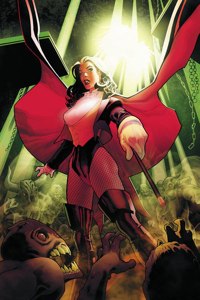Zatanna, the world’s greatest magician, is called in by local police in San Francisco to consult on a grisly crime scene. Someone is making a move on the underworld, several local crime bosses are dead, and the mutated bodies left behind point to magic being involved. A dangerous mystic who traffics in souls wants to expand his empire and the only person able to stop him is Zatanna.
Zatanna Zatara is a character who has been around since the 1960s, but this is the first time she’s had an ongoing series. The writer, Paul Dini, is well known as being a big fan of the character and his wife, Misty Lee, bears an uncanny resemblance to the character, as she is a stage magician who has been known to wear a top hat. In 2004, Zatanna gained more prominence in the DC universe as part of the Identity Crisis mini-series and since then has appeared as part of the Justice League and occasionally in Detective Comics alongside Batman. She has featured in the animated Justice League series and has been a recurring character in the last three seasons of Smallville.
Magic based characters often bounce around the DC universe with cameos in other comics or they feature as part of a larger group, such as the Justice League. Any ongoing series, such as Madame Xanadu and Constantine, tend to be more suited for mature audiences and the Vertigo imprint, given the subject matter. These comics usually involve people wielding magic in fairly unpleasant and inventive ways and the titular character trying to stop them. When they are in the mainstream universe these comics walk a fine line between adult content and something suitable for a wider audience. After reading the first volume of Zatanna I think some of the stories have lost their punch because they spend so much time straddling that difficult line, trying to be serious and funny at the same time.
In the first couple of pages Zatanna visits a crime scene that obviously involved some magic, as the dead bodies have been transformed into various animals and substances. It’s fairly grisly in places with some eviscerated bodies, and yet despite the visuals the dialogue is exposition heavy and simplistic and designed to lead you by the nose. I appreciate the need to introduce the character and set up the series for a new audience, but Dini’s writing does not seem to be on par. His run on Detective Comics were some of the best done-in-one stories that I’ve read, and his obvious love of Zatanna meant I had high expectations. I thought he would have come up with something extraordinary and an inventive way of laying the foundation and setting the scene, but that was not the case. I think this first trade is a good start but it is a little uneven.
In the story Zatanna soon uncovers who is behind the murders: a dangerous mystic known as Brother Night. She seeks him out in his own domain and warns Brother Night about stepping foot into the human world again. She does so knowing that his kind do not scare easily and that a confrontation will happen at some point. Rather than face her directly, Brother Night calls in help from other people and it escalates from there. The conclusion of this story felt a bit flat, but it did help establish the character, display her powers and explain her heritage for those who are not familiar with Zatanna. The second half of the trade was more engaging and it was a much more personal story in some ways. It showed that for all of her power, Zatanna needs help from other people from time to time. It showed her vulnerability and also her loneliness, which could explain why she was so easily duped.
There are lots of nods to other characters in the DC universe in this first volume, but it doesn’t detract from the story if you are not familiar with them. It is also a standalone title and does not have any crossover issues, so it can be read independently of any other DC titles. The artwork throughout is incredibly strong and the colours really help bring the pages to life.
Zatanna is a fun adventure comic for those who like magic based characters and mystical battles. The stories have adult themes and some of the scenes do not make it suitable for a younger audience, but it’s still a fairly light and entertaining read with a strong female lead character which is a rarity these days.
Stephen Aryan is a lifelong fan of comics, science fiction and fantasy. He co-hosts the Comic Book Outsiders podcast and writes fantasy and comic book reviews at Walker of Worlds.










